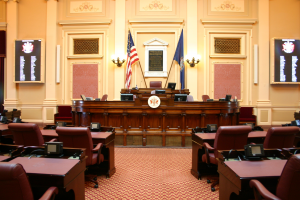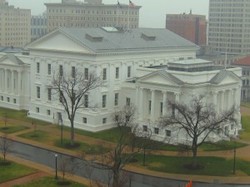|
The highlight of Black History Month took place when former President Barack Obama, along with basketball star Steph Curry, took center stage in Oakland, California to address issues facing young men of color. Obama and Curry were not there to talk about how to change federal policy. Instead, they discussed tangible ways in which young black men can facilitate stronger and safer communities.
The town hall event, sponsored by Obama’s “My Brother’s Keeper Initiative,” stressed the values of community mentorship and personal responsibility. The topics raised were wide-ranging. Among them were ways to support young men without fathers, how to reject toxic masculinity, and the importance of embracing monogamy. Obama spoke candidly about how communities need to raise the level of expectation for how young black men should act. Emphasizing that “real” men do not show their manhood by disrespecting others, or by putting women down, he tried to counteract some of the pernicious elements of culture that are found in some black communities. It was a timely reminder that a strong moral compass makes a difference in life. He also talked about the value of education. Sitting next to one of the NBA’s greatest players, he told young men they had a better chance of being a lawyer or a doctor than a professional basketball player. In my mind, these nuggets of wisdom Obama imparted were not controversial. But unsurprisingly, some people were upset with him for raising these issues.
0 Comments
Nicolás Maduro is an illegitimate president. He retained office through a sham election and has abused his powers in the process of creating a humanitarian crisis in Venezuela. Leaders across the political spectrum in the United States and beyond have recognized Juan Guaidó as the true president of the nation in chaos.
One of the leaders recognizing Guaidó is President Donald Trump. President Trump and his administration have been consistent and forceful on the situation in Venezuela. Even before European countries sided with Guaidó, Vice President Pence delivered a message of support to the Venezuelan people, promising that the United States would stand with them “until Democracy is restored” and their “birthright of Libertad” is reclaimed. The Administration has taken a stand on the right side of history, choosing the oppressed over the autocrat, precious freedom over brutal tyranny. For an administration that has been resoundingly criticized for a number of foreign policy missteps, Venezuela seems like an exception. The Trump Administration’s course of action has been the correct one. So, how worthy are they of our praise? The answer is complicated, but the reality is clear: if you are only concerned about human rights when it is politically expedient, then you aren’t actually concerned about human rights. If you were somehow unaware, Ralph Northam, the Governor of Virginia, came under fire this week after the conservative website Big League Politics reported a racist photo being displayed on the Governor’s Eastern Virginia Medical School yearbook page. The photo, which shows one person in blackface and one person in Ku Klux Klan robes (very presumably Northam and a friend), immediately prompted widespread calls for his resignation nationwide. Almost everyone from the Virginia Democratic and Republican Parties to Donald Trump and several democrats running for president have demanded that Northam step down. But, despite my personal disgust with the photo, my initial reaction was that he shouldn’t resign.
When I saw the photo, the first thing I thought of was a project I did for my AP US History class at the end of my junior year of high school. Two weeks before the exam, our teacher asked my class to prepare a short presentation on an official AP term which we had not yet had the opportunity to cover. For my project, I chose the term “minstrel shows” because, despite not really knowing what they were, I knew that they were somehow connected to African American history. I was (obviously) appalled by my research. And though I had always known that blackface was problematic, I wasn’t able to fully grasp the historical context and significance until I did that project. Unfortunately, due to a combo of snow days and poor planning by my teacher, I never actually presented my findings to the rest of the class. Instead (and pretty ironically), we spent that hour-long class period that had been allocated for the presentations going over the entirety of African American history since the end of Reconstruction. I am not exaggerating. In a day, we went from the rise of Jim Crow to A. Philip Randolph to Brown v Board of Education to the Black Power movements. And that was the only time we ever discussed such matters in the class.  by Grady Brown There has been some recent action in the Virginia General Assembly concerning state marijuana laws. At the end of January, the Senate Courts of Justice Committee killed Senate Bill 686, which would have decriminalized marijuana possession and lowered the penalty for possession from $500 to $100. However, the Republican controlled Courts and Justice Committee rejected the bill in a party line 9 – 5 vote. The bill was faced with strong opposition from law enforcement organizations. While the Senate rejected decriminalization, it did pass Senate Bill 1235, which would loosen medical restrictions on cannabis oils. A similar bill in the House of Delegates has also passed through committee. Should the bill be signed into law, epilepsy patients in the Commonwealth would be able to use marijuana oils to help treat seizures. Gov. Terry McAuliffe has already expressed his support for the bill. The mixed results in Richmond show a divided General Assembly, but a March 2014 poll from Quinnipiac University poll reported 84 percent of Virginia voters supported legalizing medical marijuana, while 13 percent were opposed. However, legalized marijuana for recreational use is still divided, with 46 percent of Virginia voters in favor and 48 percent opposed. The poll’s margin of error was +/- 2.7 percent. National support for legalized marijuana is also increasing, with a recent Gallup Poll showing 51 percent in favor and 47 percent opposed with a 4 percent margin of error.  by Gabrielle Jorgensen The Virginia House of Delegates unanimously passed Del. Timothy Hugo’s, R-Prince William, bill to define the term “human trafficking” and make coercion and recruitment into the sex trade a felony offense. The bill, whose counterpart has already passed in the state Senate, would make Virginia the last state to incorporate sex trafficking into its criminal code. While the U.S. has enacted federal legislation prohibiting trafficking and providing a roadmap for prosecution, there exists no comparable state-level statute. This transition to a codified felony is by no means a symbolic gesture. Human trafficking is not unique to Southeast Asia and Eastern Europe: it is modern enslavement, and it is happening in Virginia. Hugo’s bill, if passed through both chambers, would be a crucial step toward addressing a particularly misunderstood and underreported crime. The current state-level deficiency makes it difficult for law enforcement to identify both traffickers and their victims or for the state to systematically collect data without an apparatus for prosecution. The lack of data, in turn, allows issues like human trafficking slide under the radar of major funding sources that could potentially help victims. As noted by the Washington Post, Prince William and Fairfax counties in particular provide a surprisingly fertile breeding ground for the commercial sex trade. |
Categories
All
Archives
April 2022
|
ADDRESSVirginia Policy Review
235 McCormick Rd. Charlottesville, VA 22904 |
|
|